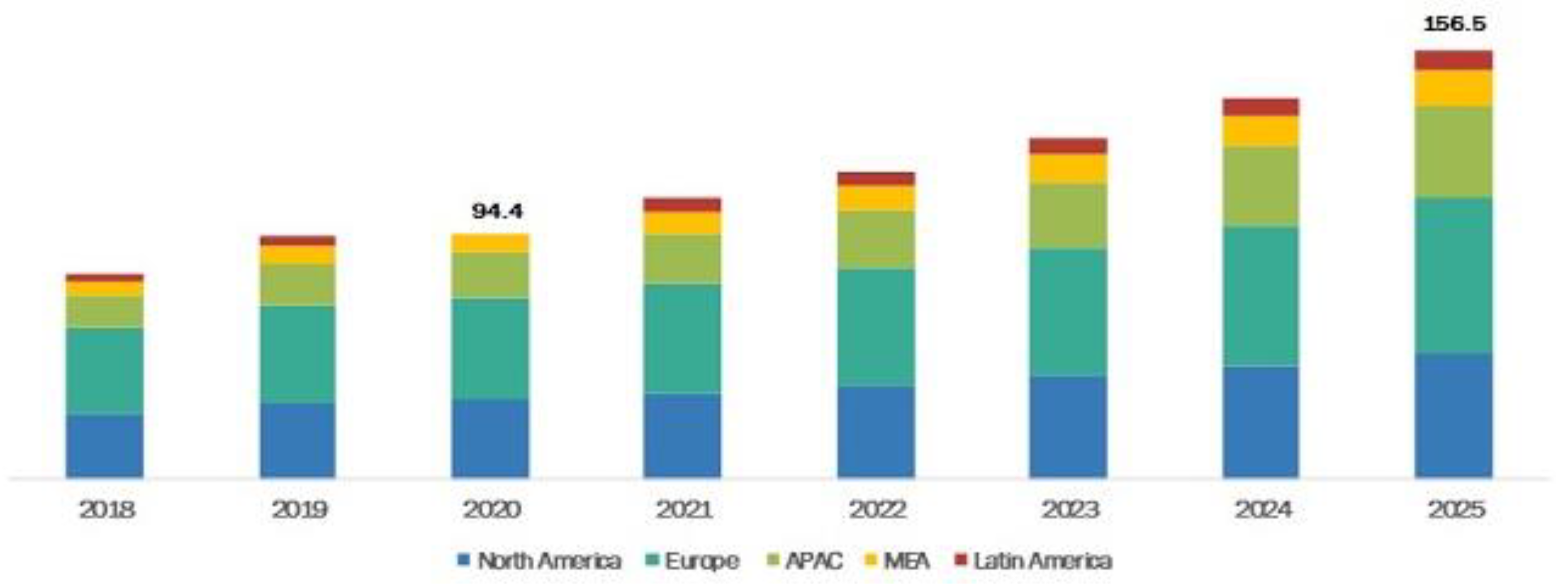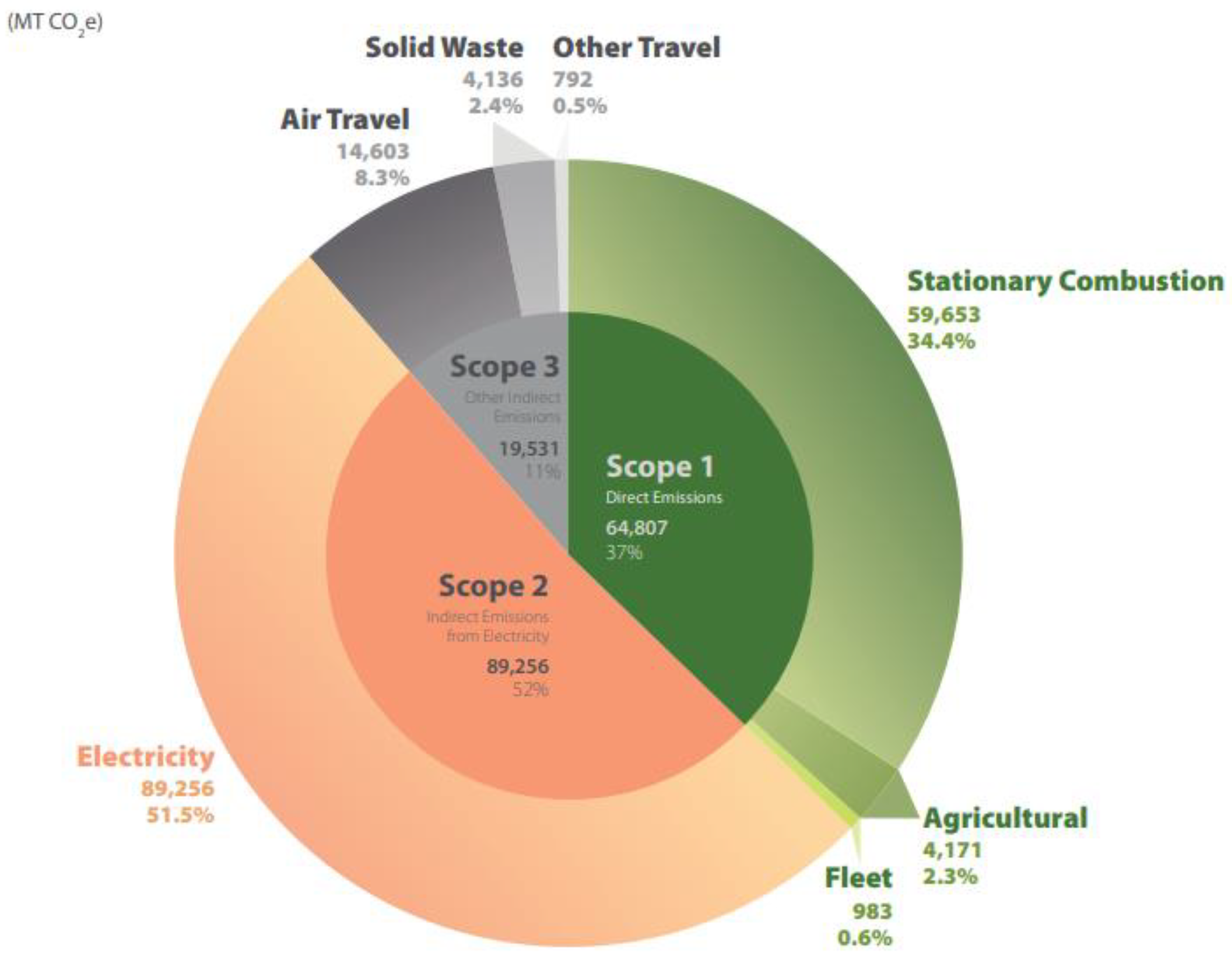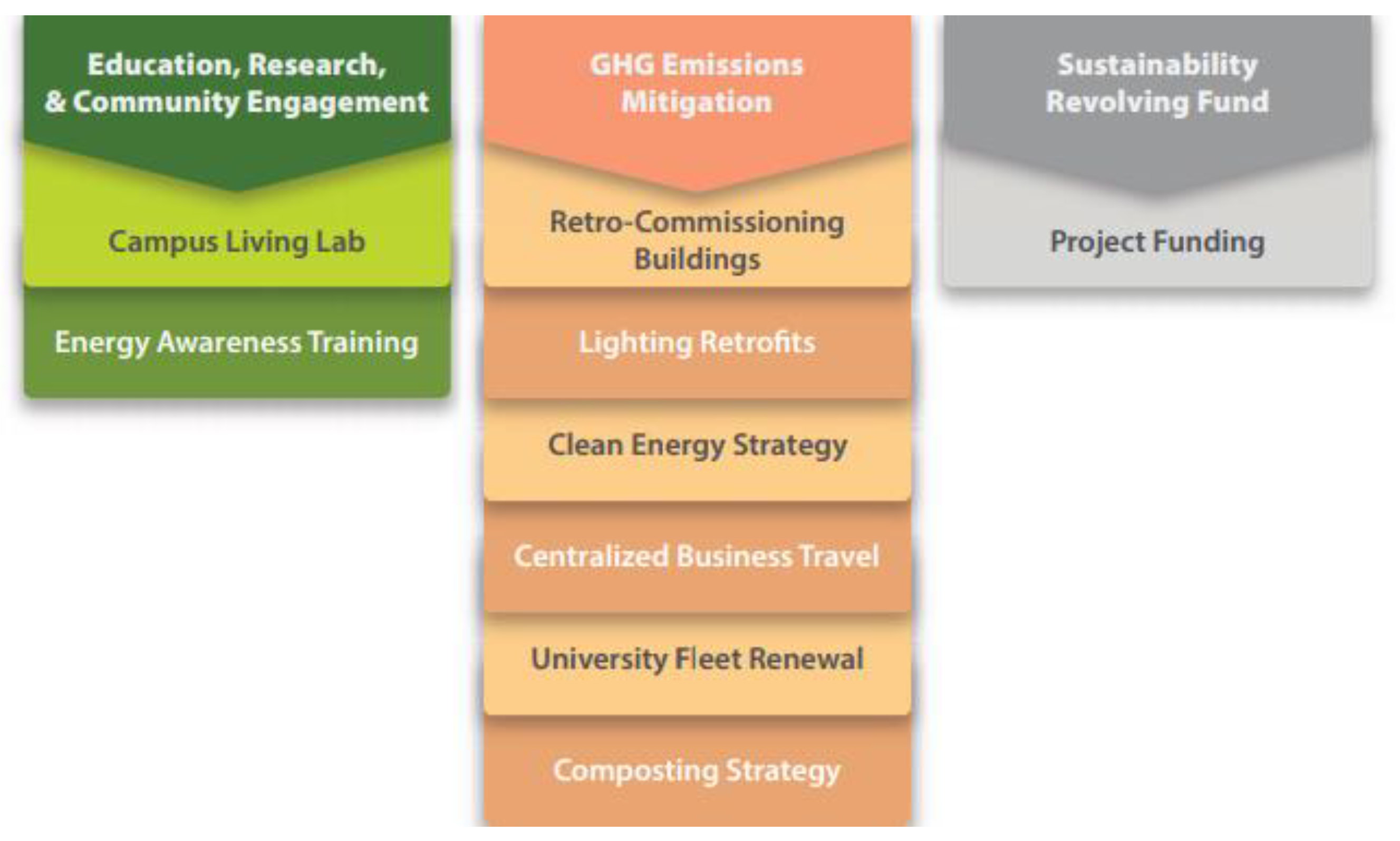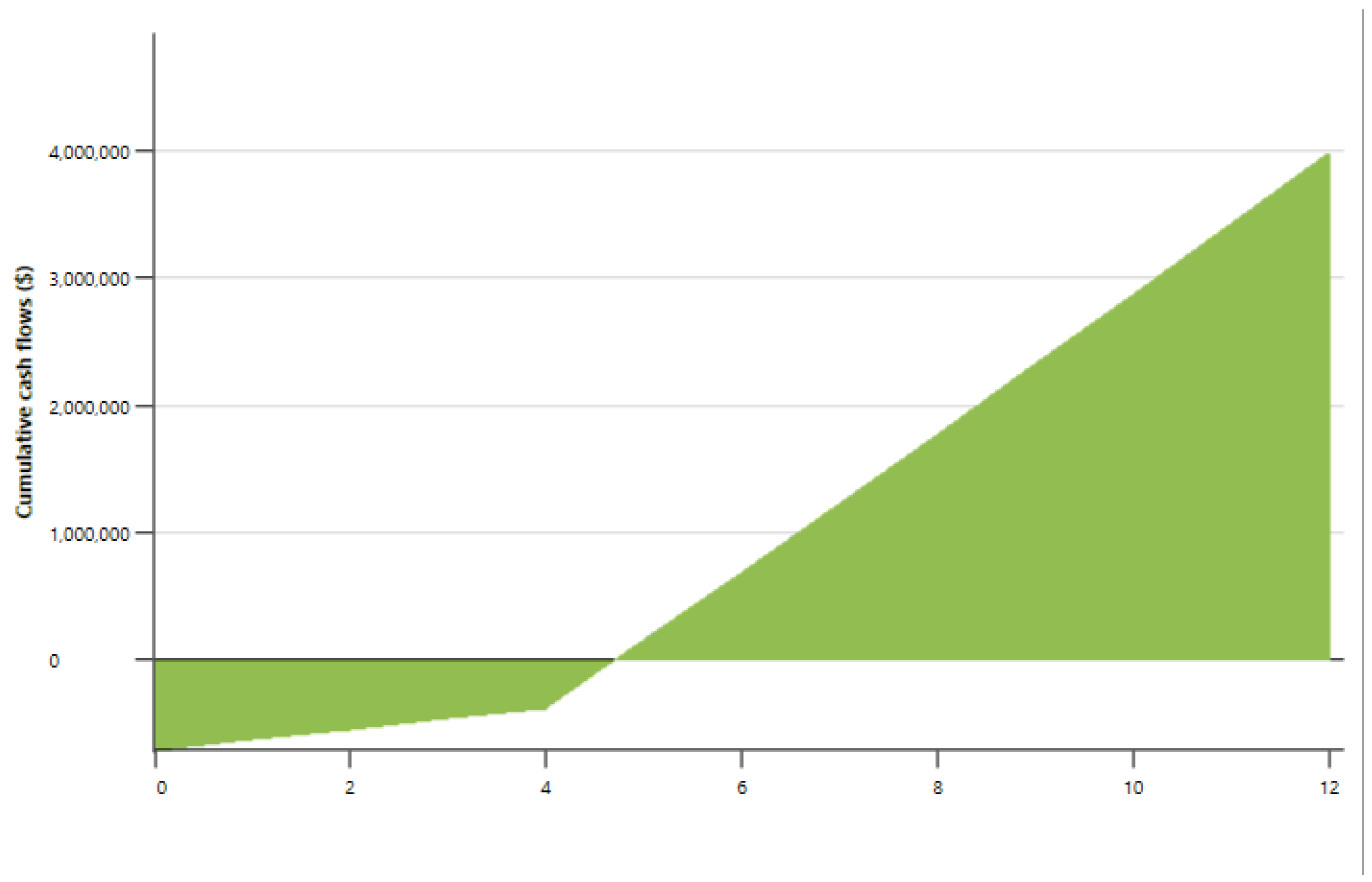Submitted:
31 December 2022
Posted:
06 January 2023
You are already at the latest version
Abstract
Keywords:
1. Introduction
2. Materials and Methods
2.1. Research Method
2.1.1. Data Collection and Data Cleaning
2.2. Modelling using RETScreen Expert
2.2.1. Brief Description of RETScreen Expert
- Power Plants
- Power, Heating, Cooling
- Industrial
- Commercial/Institutional
- Residential
- Agriculture
- Individual Measure
- Transportation
- User-Defined.
3. Results
4. Discussion
Funding
Data Availability Statement
Acknowledgments
Conflicts of Interest
References
- R. Sims and e. al., "Contribution of Working Group III to the Fifth Assessment Report of the Intergovernmental Panel on Climate Change.," in Climate Change 2014: Mitigation of Climate Change., Cambridge University Press., 2014.
- X. Li, P. Chen and X. Wang, "Impacts of renewables and socioeconomic factors on electric vehicle demands – Panel data studies across 14 countries.," Energy Policy, Vols. (Vol. 109, pp. 473–478)., 2017.
- "National Inventory Report 1990 –2019: Greenhouse Gas Sources and Sinks in Canada: Canada’s Submission to the United Nations Framework Convention on Climate Change.," Environment and Climate Change Canada., 2021. [Online]. Available: https://publications.gc.ca/collections/collection_2021/eccc/En81-4-1-2019-eng.pdf.
- Oteh, N. Vandycke and M. Duarte, "Transition towards sustainable mobility – Where is the financing?," World Bank, 2021. [Online]. Available: https://blogs.worldbank.org/transport/transition-towardssustainable-mobility-where-financing.
- "GM Plans To Phase Out Gas And Diesel Cars By 2035 - Forbes Wheels.," Forbes, 2021. [Online]. Available: https://www.forbes.com/wheels/news/gm-phase-out-gas-diesel-cars-2035/.
- "Global Infrastructure Outlook - A G20 INITIATIVE.," 30 June 2021. [Online]. Available: https://outlook.gihub.org/.
- C. A. R. Board, "Advanced Clean Trucks Fact Sheet, California Air Resources Board.," 2020. [Online]. Available: https://ww2.arb.ca.gov/resources/fact-sheets/advanced-clean-trucks-fact-sheet.
- "Growing momentum: Global overview of government targets for phasing out sales of new internal combustion engine vehicles," International Council on Clean Transportation., 2020. [Online]. Available: https://theicct.org/blog/staff/global-ice-phaseout-nov2020.
- M. Coren, "Nine countries say they’ll ban internal combustion engines — Quartz.," Quartz., 2018. [Online]. Available: https://qz.com/1341155/nine-countries-say-they-will-ban-internal-combustion-engines-none-have-a-law-to-do-so/.
- "Business Ambition for 1.5°C - Science Based Targets.," 3 July 2021. [Online]. Available: https://sciencebasedtargets.org/business-ambition-for-1-5c.
- M. Ralph and W. Stubbs, "Integrating environmental sustainability into universities.," Higher Education, vol. 67, no. 1, p. 71–90, 2014.
- L. Sharp, "Higher education: the quest for the sustainable campus," Sustainability: Science, Practice and Policy, vol. 5, no. 1, pp. 1-8, 2009.
- University of Toronto Electric Vehicle (UTEV) Research Centre, Electrical & Computer Engineering.
- University of Guelph, "New Electric Vehicle Chargers Coming to the University of Guelph," 2020. [Online]. Available: Canada.Ca. Victor, 2018.
- University Of Saskatchewan, "University Of Saskatchewan Greenhouse Gas Emissions Inventory.," [Online]. Available: https://sustainability.usask.ca/about-us/2019-greenhouse-gas-inventory-report-final---pages.pdf. [Accessed 17 July 2021].
- University of Saskatchewan, "International Plan - University Plan 2025," University of Saskatchewan, . [Online]. Available: https://plan.usask.ca/international/.
- University of Saskatchewan, OP-14: Campus Fleet | University of Saskatchewan | Scorecard | Institutions | STARS Reports., 17 July 2021 2013. [Online]. Available: https://reports.aashe.org/institutions/university-of-saskatchewan-sk/report/2013-01-18/OP/transportation/OP-14/.
- Malmgren, "EVS29 International Battery, Hybrid and Fuel Cell Electric Vehicle Symposium Quantifying the Societal Benefits of Electric Vehicles.," World Electric Vehicle Journal, vol. 8, p. 996–1007, 2016.
- C. Harto, "Electric Vehicle Ownership Costs: Chapter 2-Maintenance.," 2020. [Online]. Available: https://theicct.org/sites/default/files/publications/EV_cost_2020_2030_20190401.pdf.
- EPA, "Social Cost of Carbon," Epa Fact Sheet., 2016. [Online]. Available: https://www.whitehouse.gov/omb/oira/social-cost-of-carbon.
- Backman, "Professors explain the social cost of carbon | Stanford News.," Stanford., 2021. [Online]. Available: https://news.stanford.edu/2021/06/07/professors-explain-social-cost-carbon/.
- F. P. Perera, "Multiple threats to child health from fossil fuel combustion: Impacts of air pollution and climate change.," Environmental Health Perspectives, vol. 125, no. 2, p. 141–148, 2017.
- "How climate change threatens public health ," Yale Climate Connections., 20 July 2021. [Online]. Available: https://yaleclimateconnections.org/2019/08/how-climate-change-threatens-public-health/.
- N. Shahbol, T. Lovejoy and H. Lee, "2017," Climate Change and Biodiversity: Conservation | Request PDF. ReserachGate., [Online]. Available: https://www.researchgate.net/publication/317927439_Climate_Change_and_Biodiversity_Conservation.
- U.S. Energy Information Administration (EIA), "Crude oil prices briefly traded below $0 in spring 2020 but have since been mostly flat - Today in Energy," 2021. [Online]. Available: https://www.eia.gov/todayinenergy/detail.php?id=46336.
- T. &. A. N. Gould, "The global oil industry is experiencing a shock like no other in its history – Analysis - IEA.," IEA, 2020. [Online]. Available: https://www.iea.org/articles/the-global-oil-industry-is-experiencing-shock-like-no-other-in-its-history.
- M. Wewerinke, V. Paolo and Y. Iii, "Addressing Climate Change Through Sustainable Development and the Promotion of Human Rights.," South Centre, 2010.
- Government of Canada, "Fuel Consumption Ratings - Open Government Portal," 2020. [Online]. Available: www.canada.ca.
- RETScreen, RETScreen, 21 July 2021. [Online]. Available: https://www.nrcan.gc.ca/maps-tools-and-publications/tools/modelling-tools/retscreen/7465.
- T. Argitis, "Trudeau Hikes Carbon Tax in Bid to Reach 2030 Climate Goal - Bloomberg.," Bloomberg, 2020. [Online]. Available: https://www.bloomberg.com/news/articles/2020-12-11/trudeau-hikes-carbon-tax-positions-canada-to-hit-climate-goal.
- "Average Retail Price for Premium Unleaded Gasoline at Self Service Filling Stations. Saskatoon, SK," 22 July 2021. [Online]. Available: https://ycharts.com/indicators/saskatoon_sk_average_retail_price_for_premium_unleaded_gasoline_at_self_service_filling_stations.
- "Canada Gazette Part I," Canada Gazette Part I, 2020. [Online]. Available: https://canadagazette.gc.ca/rp-pr/p1/2021/2021-03-06/pdf/g1-15510.pdf#page=110.
- Government of Saskatchewan, "New Annual Fee Of $150 On Electric Vehicles," News and Media, 2021. [Online]. Available: https://www.saskatchewan.ca/government/news-and-media/2021/april/20/new-annual-fee-of-$150-on-electric-vehicles.
- "CER," CER – Market Snapshot: Growing electric vehicle incentives in Canada., 16 July 2021. [Online]. Available: https://www.cer-rec.gc.ca/en/data-analysis/energy-markets/market-snapshots/2018/market-snapshot-growing-electric-vehicle-incentives-in-canada.html.
- InflationCalculator, "CPI and Inflation Rates for Saskatchewan | Inflation Calculator. (n.d.).," 2020. [Online]. Available: https://inflationcalculator.ca/2020-cpi-and-inflation-rates-for-saskatchewan/.
- B. Preston, Pay Less for Vehicle Maintenance With an EV - Consumer Reports., 2020. [Online]. Available: https://www.consumerreports.org/car-repair-maintenance/pay-less-for-vehicle-maintenance-with-an-ev/.
- R. MacDonnell, " What Kind of Interest Rates Should You Expect? Car Reviews Canada, New & Used Automotive News and Tips," Go Auto, 2019. [Online]. Available: https://www.goauto.ca/blog/credit-score-interest-rates-canada.
- McKinsey, "Improving electric vehicle economics," 2019. [Online]. Available: https://www.mckinsey.com/industries/automotive-and-assembly/our-insights/making-electric-vehicles-profitable.
- Saskatchewan, University of, Climate Action - Office of Sustainability, 17 July 2021. [Online]. Available: https://sustainability.usask.ca/footprint/climate-action.php#RelevantLinks.
- Government of Canada, "New Electric Vehicle Chargers Coming to the University of Guelph - Canada.ca.," University of Guelph - Canada.ca, 2020. [Online]. Available: https://www.canada.ca/en/natural-resources-canada/news/2020/10/new-electric-vehicle-chargers-coming-to-the-university-of-guelph.html.
- University of Toronto Electric Vehicle (UTEV) Research Centre | Electrical & Computer Engineering. (n.d.)., [Online]. Available: https://www.ece.utoronto.ca/research/centres/university-toronto-electric-vehicle-utev-research-centre/. [Accessed 16 July 2021].




| Vehicle Type | FLEET | TYPE | STATE | FUEL | Litre | Avg km travelled | kW/h | Litre/ 100Km |
|---|---|---|---|---|---|---|---|---|
| 2001 CHEVROLET S-10 1/4 TON TRUCK | FLEET | TRUCK | ACTIVE | Gasoline | 342 | 2,407 | 3184.94 | 14.2 |
| 2002 DODGE ST2500 4X2 QUAD CAB WITH VAN BODY | FLEET | TRUCK | ACTIVE | Gasoline | 942 | 4,400 | 8772.55 | 21.4 |
| 2002 FORD E150 1/2 TON CARGO VAN | FLEET | VAN | ACTIVE | Gasoline | 328 | 1,795 | 3054.56 | 18.3 |
| 2002 FORD E152 CARGO VAN PACKAGE | FLEET | VAN | ACTIVE | Gasoline | 419 | 2,291 | 3902.02 | 18.3 |
| 2002 FORD E152 CARGO VAN PACKAGE | FLEET | VAN | ACTIVE | Gasoline | 298 | 1,627 | 2775.18 | 18.3 |
| 2002 FORD E152 CARGO VAN PACKAGE | FLEET | VAN | ACTIVE | Gasoline | 290 | 1,583 | 2700.68 | 18.3 |
| 2002 FORD E152 CARGO VAN PACKAGE | FLEET | VAN | ACTIVE | Gasoline | 305 | 1,669 | 2840.37 | 18.3 |
| 2002 FORD SUPER DUTY F-450 REGULAR CHASSIS CAB 4 X | FLEET | TRUCK | ACTIVE | Gasoline | 735 | 7,002 | 6844.83 | 10.5 |
| 2003 FORD E152 CARGO VAN | FLEET | VAN | ACTIVE | Gasoline | 382 | 2,034 | 3557.45 | 18.8 |
| 2003 FORD E152 CARGO VAN | FLEET | VAN | ACTIVE | Gasoline | 521 | 2,770 | 4851.91 | 18.8 |
| 2003 FORD E152 CARGO VAN | FLEET | VAN | ACTIVE | Gasoline | 418 | 2,225 | 3892.7 | 18.8 |
| 2003 FORD E152 CARGO VAN | FLEET | VAN | ACTIVE | Gasoline | 582 | 3,094 | 5419.98 | 18.8 |
| 2004 FORD E150 CARGO VAN | FLEET | VAN | ACTIVE | Gasoline | 254 | 1,458 | 2365.42 | 17.4 |
| 2004 FORD E150 VAN | FLEET | VAN | ACTIVE | Gasoline | 170 | 974 | 1583.16 | 17.4 |
| 2004 FORD E150 VAN | FLEET | VAN | ACTIVE | Gasoline | 258 | 1,483 | 2402.67 | 17.4 |
| 2004 GMC EXPRESS COMMERCIAL CUTAWAY VAN | FLEET | VAN | ACTIVE | Gasoline | 440 | 2,416 | 4097.58 | 18.2 |
| 2005 CHEV HD SILVERADO 3/4 TON TRUCK | FLEET | TRUCK | ACTIVE | Gasoline | 613 | 3,294 | 5708.68 | 18.6 |
| 2005 CHEV SILVERADO 1 TON TRUCK | FLEET | TRUCK | ACTIVE | Gasoline | 614 | 3,303 | 5717.99 | 18.6 |
| 2006 CHEV EXPRESS CARGO 1/2 TON VAN | FLEET | VAN | ACTIVE | Gasoline | 287 | 1,579 | 2672.74 | 18.2 |
| 2006 CHEV EXPRESS CARGO 1/2 TON VAN | FLEET | VAN | ACTIVE | Gasoline | 690 | 3,790 | 6425.76 | 18.2 |
| 2006 DODGE DAKOTA CLUB CAB TRUCK | FLEET | TRUCK | ACTIVE | Gasoline | 240 | 1,570 | 2235.05 | 15.3 |
| 2006 FORD E150 CARGO VAN | FLEET | VAN | ACTIVE | Gasoline | 264 | 1,500 | 2458.55 | 17.6 |
| 2007 DODGE CARAVAN CARGO VAN | FLEET | VAN | ACTIVE | Gasoline | 468 | 3,418 | 4358.34 | 13.7 |
| 2007 FORD E150 1/2 TON VAN | FLEET | VAN | ACTIVE | Gasoline | 219 | 1,182 | 2039.48 | 18.5 |
| 2007 FORD FREESTAR VAN | FLEET | VAN | ACTIVE | Gasoline | 80 | 512 | 745.012 | 15.6 |
| 2007 STERLING ACTERRA 3 TON DUMP TRUCK | FLEET | TRUCK | ACTIVE | Diesel | 1,373 | 4,429 | 31.8 | |
| 2008 CHEV EXPRESS 1/2 TON CARGO VAN | FLEET | VAN | ACTIVE | Gasoline | 293 | 1,863 | 2728.62 | 15.7 |
| 2008 CHEV EXPRESS 1/2 TON CARGO VAN | FLEET | VAN | ACTIVE | Gasoline | 511 | 3,255 | 4758.78 | 15.7 |
| 2008 CHEV EXPRESS 1/2 TON CARGO VAN | FLEET | VAN | ACTIVE | Gasoline | 637 | 4,058 | 5932.18 | 15.7 |
| 2008 CHEV EXPRESS 1/2 TON CARGO VAN | FLEET | VAN | ACTIVE | Gasoline | 106 | 675 | 987.145 | 15.7 |
| k2008 CHEV UPLANDER | FLEET | VAN | ACTIVE | Gasoline | 61 | 414 | 568.07 | 14.7 |
| 2008 FORD 1/4 TON RANGER XL TRUCK | FLEET | TRUCK | ACTIVE | Gasoline | 627 | 4,934 | 5839.06 | 12.7 |
| 2008 STERLINE 360 COE30 CAB & CHASSIS | FLEET | TRUCK | ACTIVE | Diesel | 929 | 2,921 | 31.8 | |
| 2009 CHEV EXPRESS 1500 1/2 TON CARGO VAN | FLEET | VAN | ACTIVE | Gasoline | 656 | 4,175 | 6109.12 | 15.7 |
| 2009 CHEV EXPRESS 1500 1/2 TON CARGO VAN | FLEET | VAN | ACTIVE | Gasoline | 199 | 1,269 | 1853.23 | 15.7 |
| 2009 CHEV EXPRESS 1500 1/2 TON CARGO VAN | FLEET | VAN | ACTIVE | Gasoline | 485 | 3,089 | 4516.65 | 15.7 |
| 2009 CHEV EXPRESS 1500 1/2 TON PASSENGER VAN | FLEET | VAN | ACTIVE | Gasoline | 185 | 1,175 | 1722.85 | 15.7 |
| 2009 CHEV SILVERADO 3500HD 1-TON TRUCK (SANDER) | FLEET | TRUCK | ACTIVE | Gasoline | 1,048 | 6,675 | 9759.69 | 15.7 |
| 2009 CHEV UPLANDER | FLEET | VAN | ACTIVE | Gasoline | 465 | 3,165 | 4330.4 | 14.7 |
| 2009 CHEV UPLANDER | FLEET | VAN | ACTIVE | Gasoline | 56 | 379 | 521.51 | 14.7 |
| 2009 CHEV UPLANDER | FLEET | VAN | ACTIVE | Gasoline | 118 | 802 | 1098.89 | 14.7 |
| 2009 JOHN DEERE 4X4 GATOR | FLEET | UTILITY | ACTIVE | Gasoline | 135 | 378 | 1257.21 | 35.7 |
| 2010 CHEV EXPRESS 1500 CARGO VAN | FLEET | VAN | ACTIVE | Gasoline | 809 | 5,154 | 7533.96 | 15.7 |
| 2010 CHEV EXPRESS 1500 CARGO VAN | FLEET | VAN | ACTIVE | Gasoline | 335 | 2,132 | 3119.75 | 15.7 |
| 2010 CHEV EXPRESS 1500 CARGO VAN | FLEET | VAN | ACTIVE | Gasoline | 427 | 2,722 | 3976.52 | 15.7 |
| 2010 CHEV EXPRESS 1500 CARGO VAN | FLEET | VAN | ACTIVE | Gasoline | 351 | 2,236 | 3268.75 | 15.7 |
| 2010 CHEV EXPRESS 1500 CARGO VAN | FLEET | VAN | ACTIVE | Gasoline | 168 | 1,070 | 1564.53 | 15.7 |
| 2010 CHEV EXPRESS 1500 CARGO VAN | FLEET | VAN | ACTIVE | Gasoline | 86 | 546 | 800.89 | 15.7 |
| 2010 CHEV EXPRESS 1500 CARGO VAN | FLEET | VAN | ACTIVE | Gasoline | 1,658 | 10,561 | 15440.4 | 15.7 |
| 2010 CHEV EXPRESS 1500 CARGO VAN | FLEET | VAN | ACTIVE | Gasoline | 344 | 2,188 | 3203.57 | 15.7 |
| 2010 CHEV EXPRESS 1500 CARGO VAN | FLEET | VAN | ACTIVE | Gasoline | 398 | 2,532 | 3706.45 | 15.7 |
| 2010 CHEV SILVERADO 3500HD 1 TON FLAT DECK TRUCK | FLEET | TRUCK | ACTIVE | Gasoline | 1,717 | 10,935 | 15989.9 | 15.7 |
| 2010 DODGE GRAND CARAVAN | FLEET | VAN | ACTIVE | Gasoline | 1,158 | 8,452 | 10784.1 | 13.7 |
| 2011 CHEV EXPRESS 1500 CARGO VAN | FLEET | VAN | ACTIVE | Gasoline | 608 | 3,873 | 5662.11 | 15.7 |
| 2011 CHEV SILVERADO 2500HD | FLEET | TRUCK | ACTIVE | Gasoline | 771 | 4,912 | 7180.08 | 15.7 |
| 2011 DODGE GRAND CARAVAN | FLEET | VAN | ACTIVE | Gasoline | 186 | 1,358 | 1732.16 | 13.7 |
| 2011 DODGE GRAND CARAVAN | FLEET | VAN | ACTIVE | Gasoline | 209 | 1,524 | 1946.35 | 13.7 |
| 2011 JOHN DEERE HPX GATOR | FLEET | UTILITY | ACTIVE | Gasoline | 158 | 443 | 1471.4 | 35.7 |
| 2011 JOHN DEERE HPX GATOR | FLEET | UTILITY | ACTIVE | Gasoline | 291 | 815 | 2709.99 | 35.7 |
| 2012 CHEV EXPRESS 1500 CARGO VAN | FLEET | VAN | ACTIVE | Gasoline | 379 | 2,417 | 3529.51 | 15.7 |
| 2012 DODGE GRAND CARAVAN | FLEET | VAN | ACTIVE | Gasoline | 407 | 2,968 | 3790.26 | 13.7 |
| 2012 DODGE GRAND CARAVAN | FLEET | VAN | ACTIVE | Gasoline | 366 | 2,674 | 3408.44 | 13.7 |
| 2012 FORD TRANSIT CONNECT | FLEET | VAN | ACTIVE | Gasoline | 519 | 4,432 | 4833.29 | 11.7 |
| 2013 FORD E 150 CARGO VAN | FLEET | VAN | ACTIVE | Gasoline | 517 | 2,889 | 4814.66 | 17.9 |
| 2013 FORD E 150 CARGO VAN | FLEET | VAN | ACTIVE | Gasoline | 287 | 1,603 | 2672.74 | 17.9 |
| 2013 FORD E 150 CARGO VAN | FLEET | VAN | ACTIVE | Gasoline | 614 | 3,428 | 5717.99 | 17.9 |
| 2013 FORD F550 XL (BUCKET TRUCK) | FLEET | TRUCK | ACTIVE | Gasoline | 1,024 | 5,222 | 9536.19 | 19.6 |
| 2014 CHEV EXPRESS 1500 CARGO VAN | FLEET | VAN | ACTIVE | Gasoline | 567 | 3,318 | 5280.29 | 17.1 |
| 2014 CHEV EXPRESS 1500 CARGO VAN | FLEET | VAN | ACTIVE | Gasoline | 205 | 1,199 | 1909.1 | 17.1 |
| 2014 CHEV EXPRESS 1500 CARGO VAN | FLEET | VAN | ACTIVE | Gasoline | 521 | 3,048 | 4851.91 | 17.1 |
| 2014 CHEV EXPRESS 1500 CARGO VAN | FLEET | VAN | ACTIVE | Gasoline | 797 | 4,663 | 7422.21 | 17.1 |
| 2014 DODGE GRAND CARAVAN | FLEET | VAN | ACTIVE | Gasoline | 334 | 2,441 | 3110.44 | 13.7 |
| 2014 DODGE GRAND CARAVAN | FLEET | VAN | ACTIVE | Gasoline | 218 | 1,591 | 1992.92 | 13.7 |
| 2014 FORD E150 CARGO VAN | FLEET | VAN | ACTIVE | Gasoline | 441 | 2,490 | 4106.89 | 17.7 |
| 2014 FORD E150 CARGO VAN | FLEET | VAN | ACTIVE | Gasoline | 201 | 1,134 | 1871.85 | 17.7 |
| 2014 FORD TRANSIT CONNECT CARGO VAN | FLEET | VAN | ACTIVE | Gasoline | 264 | 2,446 | 2458.55 | 10.8 |
| 2015 DODGE GRAND CARAVAN | FLEET | VAN | ACTIVE | Gasoline | 242 | 1,763 | 2253.67 | 13.7 |
| 2015 JOHN DEERE 4 X 2 GATOR (TEST LM0025 SEPT 30/15) | FLEET | UTILITY | ACTIVE | Gasoline | 11 | 34 | 102.44 | 32 |
| 2016 CHEV EXPRESS 1500 CARGO VAN | FLEET | VAN | ACTIVE | Gasoline | 1,817 | 8,261 | 16921.2 | 22 |
| 2016 CHEVROLET COLORADO CREW CAB | FLEET | TRUCK | ACTIVE | Gasoline | 769 | 6,463 | 7161.46 | 11.9 |
| 2016 CHEVROLET COLORADO CREW CAB | FLEET | TRUCK | ACTIVE | Gasoline | 1,130 | 9,498 | 10523.3 | 11.9 |
| 2016 DODGE GRAND CARAVAN | FLEET | VAN | ACTIVE | Gasoline | 15 | 110 | 139.69 | 13.7 |
| 2016 DODGE GRAND CARAVAN | FLEET | VAN | ACTIVE | Gasoline | 319 | 2,331 | 2970.75 | 13.7 |
| 2016 DODGE GRAND CARAVAN | FLEET | VAN | ACTIVE | Gasoline | 78 | 566 | 726.39 | 13.7 |
| 2016 DODGE GRAND CARAVAN | FLEET | VAN | ACTIVE | Gasoline | 1,113 | 8,122 | 13.7 | 13.7 |
| 2016 DODGE GRAND CARAVAN | FLEET | VAN | ACTIVE | Gasoline | 357 | 2,604 | 3324.63 | 13.7 |
| 2017 Chev Express 2500 Cargo Van | FLEET | VAN | ACTIVE | Gasoline | 313 | 1,435 | 2914.87 | 21.8 |
| 2017 Chev Silverado 1500 | FLEET | TRUCK | ACTIVE | Gasoline | 704 | 4,818 | 6556.13 | 14.6 |
| 2017 Ford F150 | FLEET | TRUCK | ACTIVE | Gasoline | 889 | 7,285 | 8278.98 | 12.2 |
| 2017 Ford Transit | FLEET | VAN | ACTIVE | Gasoline | 477 | 4,011 | 4442.15 | 11.9 |
| 2018 Chev Silverado 1500 | FLEET | TRUCK | ACTIVE | Gasoline | 866 | 5,934 | 8064.79 | 14.6 |
| Fuel Type | Total Fuel Usage in 2020,Liters | Number ofVehicles | ||||||
| Gasoline | 39,842 | 89 | ||||||
| Diesel | 2,302 | 2 | ||||||
Disclaimer/Publisher’s Note: The statements, opinions and data contained in all publications are solely those of the individual author(s) and contributor(s) and not of MDPI and/or the editor(s). MDPI and/or the editor(s) disclaim responsibility for any injury to people or property resulting from any ideas, methods, instructions or products referred to in the content. |
© 2023 by the authors. Licensee MDPI, Basel, Switzerland. This article is an open access article distributed under the terms and conditions of the Creative Commons Attribution (CC BY) license (http://creativecommons.org/licenses/by/4.0/).




